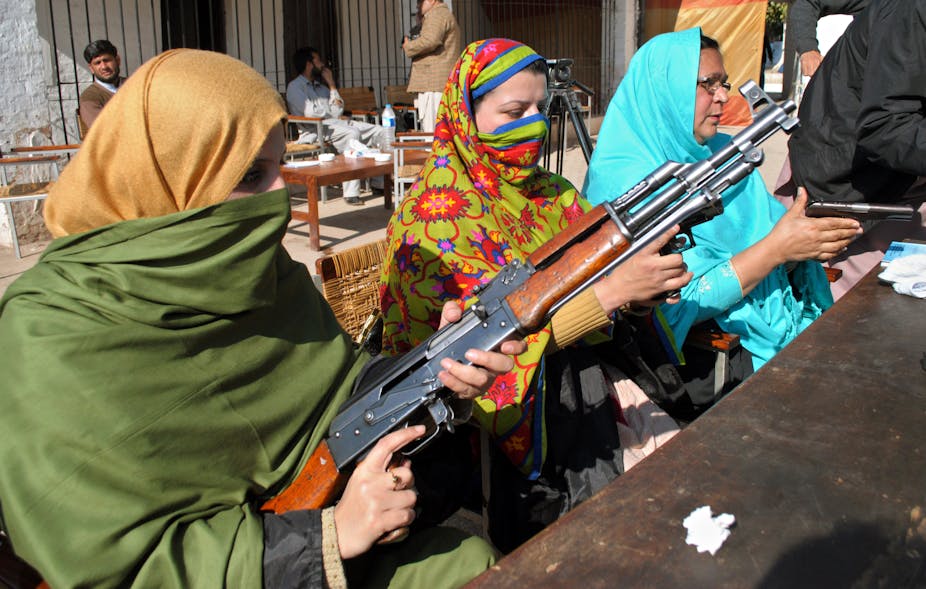The attack on Peshawar’s Army Public School in December by the Pakistani Taliban in which 150 students and their teachers were killed, was one of the most traumatic events of the post-9/11 violence across the Indus Valley regions shared by Pakistan and Afghanistan. It sparked a flurry of reactions from politicians – and now a move to arm teachers and train them to stave off future attacks. Yet many elements of Pakistani society are uncomfortable with outsourcing security to educators.
The horrific murders happened in the wake of two military operations in the tribal regions of the Frontier Province of Khyber Pakhtunkhwa (KP), hemmed in between the Indus River to the east and the Durand Line to the west that mark the Pakistan-Afghan borders devised by the British in 1893.
Peshawar, an ancient city on this side of the famous Khyber Pass, was the nerve centre under the various Hindu and Muslim kingdoms until the British took over in 1849, when it became the most forward strategic point for the Raj in its cold and hot war with the Russians and the Afghans – often called the Great Game. Other than its military and geographic significance, over the past two centuries Peshawar has boasted quality schools including Edwardes College – the earliest Western higher education institution on the frontier which is not far from Army Public School, the focal point of the indiscriminate killings on that cold December day.
Schools have become new targets
Despite the various historical contests in this predominantly Pashtun region, the schools, monasteries, Sufi shrines, temples, churches and madrassas were spared of internecine warfare. So these murders by the Taliban, a year after a similar attack on a local church in September 2013, present a totally different, but no less dire challenge for pupils, parents and politicians.
A year earlier, a suicide bomber tried to walk into a busy school in Hangu, about 40 miles from Peshawar, and was only stopped by another brave pupil, Aitazaz Hasan, who was outside the school gate. The vest exploded and both the perpetrator and Hasan were killed – yet 700 students inside the school escaped a heinous tragedy.
The authorities now want to deter the Taliban by arming teachers. Amid numerous measures to ward off any such future atrocities, the provincial government has decided to issue arms licences to schools. Teachers and staff will also be given weapons training. It has become a major issue of contention among “argumentative” Pakistanis.
Test for Imran Khan
The KP government is led by Imran Khan’s Movement for Justice Party (Tehreek-i-Insaf), which, other than protesting against the CIA-operated drone attacks in the tribal belt, has often espoused negotiations with the Pakistani Taliban. The killings of so many young pupils and their teachers has been immensely unnerving for the cricketer-turned-politician. His visit to the Army Public School a month after the attack was met by protests by parents angry that he had not come sooner.
Like other military and civilian leaders, he has begun opting for more assertive and even punitive policies directed against the perpetrators.

But in his public statements, Khan still views NATO’s longest engagement next door in Afghanistan and frequent drone attacks on Pakistani tribal territories as the major cause for this violence, which has already claimed more than 57,000 Pakistani lives.
The announcement that schoolteachers would be armed was a follow-up to the National Action Plan, devised by the country’s political and military authorities in early January. This stipulated the formation of military courts, the resumption of death sentence by hanging, trials of people spewing hateful speeches and literature, along with intensifying military campaigns in Waziristan and Khyber.
According to initial reports, a provincial convention representing 78,000 male and female teachers has raised serious objections to their new role. According to them, and some parents of the Army School, providing security is a state prerogative and teachers must not be cast in the role of armed guards.
Since the announcement, Pakistani television channels, the country’s newspapers and international media have carried pictures of teachers – both men and women —- undergoing training sessions on handling explosives, suicide vests, revolvers and Kalashnikovs. These television reports and pictures of teachers doing target practice have shocked Pakistani civil society.
Backlash from civil society
The lawyers, teachers and other human rights activists in the country, though no less sensitive to imminent threats, are aghast at this new development, which may only serve to accentuate fear among the students. Since 2001, it has not been uncommon to see armed guards outside banks, offices, courts and some elite and military schools, but academic institutions in general and the teachers in particular were never co-opted in the role as armed vigilantes.
Pakistan is not the first or only country to arm its teachers. Since 2013, following a string of school massacres, 33 states within the US have legislated 80 laws allowing staff and teachers to be armed while working on school premises.
Pakistani parents, especially in Peshawar and other KP towns, are in favour of diverse security measures including higher boundary walls, security cameras, frequent armed patrols and body searches at entry points. But the chattering classes are polarising in a society which has found itself at the cusp of multiple forms of violence over the past decade.
Civil society in Pakistan feels that it is only through resolving regional and domestic conflicts and by empowering the judicial system, and the induction of police reforms and security outfits that the country can finally get rid of recurrent violence. In the same vein, the liberal elements demand an overhaul of the curriculum of the religious seminaries (madrassas), and a more responsible usage of public media that disallows any type of militancy.
In a country of 180m, the per capita ratio of Pakistani police and security personnel is starkly inadequate. Tangible solutions are needed so that peace can be ensured for all Pakistanis.

